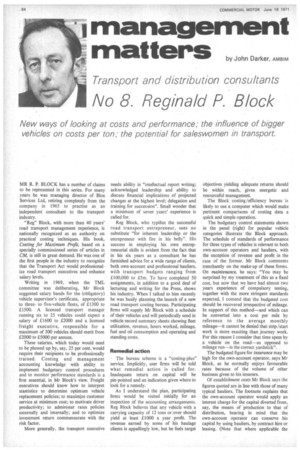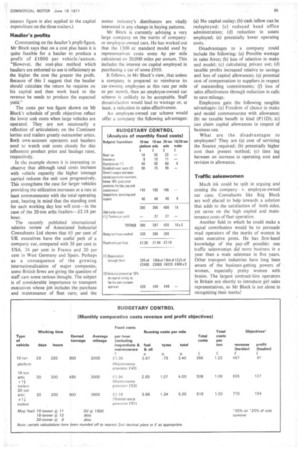management
Page 86

Page 87

If you've noticed an error in this article please click here to report it so we can fix it.
matters by John Darker, AMBIM
Transport and distribution consultants
No 8. Reginald P. Block
MR R. P. BLOCK has a number of claims to be represented in this series. For many years he was managing director of Blox Services Ltd, retiring completely from the company in 1965 to practise as an independent consultant to the transport industry.
"Reg" Block, with more than 40 years' road transport management experience, is nationally recognized • as an authority on practical costing techniques. His book, Costing for Maximum Profit, based on a specially commissioned series of articles in CM, is still in great demand. He was one of the first people in the industry to recognize that the Transport Act would professionalize road transport executives and enhance salary levels.
Writing in 1969, when the TML committee was deliberating, Mr Block suggested salary bands for the (obligatory) vehicle supervisor's certificate, appropriate to threeto five-vehicle fleets, of £1300 to £1500. A licensed transport manager running six to 25 vehicles could expect a salary of £1600 to £2000 and a licensed freight executive, responsible for a maximum of 300 vehicles should merit from £2000 to £5000 per annum.
These salaries, which today would need to be plussed up by, say, 25 per cent, would require their recipients to be professionally trained. Costing and management accounting knowledge with ability to implement budgetary control procedures and to monitor performance standards is a first essential, in Mr Block's view. Freight executives should know how to interpret stastistics to determine optimum vehicle replacement policies; to maximize customer service at minimum cost; to motivate driver productivity; to administer rates policies externally and internally; and to optimize investment return commensurate with the risk factor.
More generally, the transport executive needs ability in "intellectual report writing; acknowledged leadership and ability to discuss financial implications of projected changes at the highest level; delegation and training for succession". Small wonder that a minimum of seven years' experience is called for.
Reg Block, who typifies the successful road transport entrepreneur, sees no substitute "for inherent leadership or the entrepreneur with fire in his belly". His success in employing his own entrepreneurial skills is evident from the fact that in his six years as a consultant he has furnished advice for a wide range of clients, both own-account and professional hauliers, with transport budgets ranging from £100,000 to £5m. To have completed 50 assignments, in addition to a good deal of lecturing and writing for the Press, shows his industry. When I talked to him recently he was busily planning the launch of a new road transport costing bureau. Participating firms will supply Mr Block with a schedule of their vehicles and will periodically send in vehicle record summary sheets showing fleet utilization, revenue, hours worked, mileage, fuel and oil consumption and operating and standing costs.
Remedial action The bureau scheme is a "costing-plus" service. Implicitly, user firms will be told what remedial action is called for. Inadequate return on capital will be pin-pointed and an indication given where to look for a remedy.
As I understand the plan, participating firms would be visited initially for an inspection of the accounting arrangements. Reg Block believes that any vehicle with a carrying capacity of 12 tons or over should yield at least £1000 a year profit. The revenue earned by some of his haulage clients is appallingly low, but he feels target objectives yielding adequate returns should be within reach, given energetic and resourceful management.
The Block costing /efficiency bureau is likely to use a computer which would make pertinent comparisons of costing data a quick and simple operation.
The budgetary control statements shown in the panel (right) for popular vehicle categories illustrate the Block approach. The schedule of standards of performance for three types of vehicles is relevant to both own-account operators and hauliers, with the exception of revenue and profit in the case of the former. Mr Block comments trenchantly on the make-up of these forms. On maintenance, he says: "You may be surprised by my treatment of this as a fixed cost, but now that we have had almost two years experience of compulsory testing, together with the more stringent standards expected, I contend that the budgeted cost should be recovered irrespective of mileage. In support of this method—and which can be converted into a cost per mile by reference to the average monthly mileage—it cannot be denied that stop/start work is more exacting than journey work. For this reason I consider that time spent by a vehicle on the road—as opposed to mileage run—is the correct yardstick".
The budgeted figure for insurance may be high for the own-account operator, says Mr Block, as he normally enjoys; favourable rates because of the volume of other business given to his insurers.
Of establishment costs Mr Block says the figures quoted are in line with those of many typical hauliers. The footnote explains that the own-account operator would apply an interest charge for the capital diverted from, say, the means of production to that of distribution, bearing in mind that the own-account operator can conserve his capital by using hauliers, by contract hire or leasing. (Note that where applicable the
interest figure is also applied to the capital expenditure on the three trailers.) Haulier's profits
Commenting on the haulier's profit figure. Mr Block says that on a cost plus basis it is quite feasible for a .haulier to produce a profit of £1000 per vehicle/annum. "However, the cost-plus method which hauliers are exhorted to use is inflationary as the higher the cost the greater the profit. Because of this I suggest that the haulier should calculate the return he requires on his capital and then work back to the revenue he needs to produce the expected yield."
The costs per ton figure shown on Mr Block's schedule of profit objectives reflect the lower unit costs when large vehicles are operated. They are not necessarily a reflection of articulation; on the Continent lorries and trailers greatly outnumber artics. Both own-account operators and hauliers need to watch unit costs closely for this influences product price and haulage rates, respectively.
In the example shown it is interesting to observe that although total costs increase with vehicle capacity the higher tonnage carried reduces the unit cost progressively. This strengthens the case for larger vehicles providing the utilization increases at a rate at least commensurate with the total operating cost, bearing in mind that the standing cost for each working day lost will cost—in the case of the 20-ton artic Arailers—£2.18 per hour.
• The recently published international salaries review of Associated Industrial Consultants Ltd shows that 65 per cent of UK executives have the useful perk of a company car, compared with 38 per cent in USA, 24 per cent in France and 20 per cent in West Germany and Spain. Perhaps as a consequence of the growing internationalization of major companies, some British firms are giving the question of staff cars some serious thought. The subject is of considerable importance to transport executives whose job includes the purchase and maintenance of fleet cars; and the motor industry's distributors are vitally interested in any change in buying patterns.
Mr Block is currently advising a very large company on the merits of companyor employee-owned cars. He has worked out that the 1300 cc standard model used by representatives costs some 4p per mile calculated on 20,000 miles per annum. This includes the interest on capital employed in purchasing a car of some £950.
It follows, in Mr Block's view, that unless a company is prepared to reimburse its car-owning employees at this rate per mile or per month, then an employee-owned car scheme is unlikely to be acceptable. Staff dissatisfaction would lead to wastage or, at least, a reduction in sales-effectiveness.
An employee-owned car scheme would offer a company the following advantages: (a) No capital outlay; (b) cash inflow can be redeployed; (c) reduced head office administration; (d) reduction in assets employed; (e) potentially lower operating costs.
Disadvantages to a company could include the following: (a) Possible wastage in sales force; (b) loss of selection in make and model; (c) calculating private use; (d) taxable profits increased relative to savings and loss of capital allowances; (e) potential cost of compensation to suppliers in respect of outstanding commitments; (f) loss of sales effectiveness through reduction in calls to save mileage.
Employees gain the following tangible advantages: (a) Freedom of choice in make and model commensurate with allowance; (b) no taxable benefit in kind (P11D); (c) can claim capital allowances in respect of business use.
What are the disadvantages to employees? They are (a) cost of servicing the finance _required; (b) potentially higher cost than present method; (c) time lag between an increase in operating cost and revision in allowance.
Traffic saleswomen Much ink could he spilt in arguing and costing the companyv. employee-owned car case. Consultants like Reg Block are well placed to help towards a solution that adds to the satisfaction of both sides, yet saves on the high capital and maintenance costs of fleet operation.
Another field in which he could make a signal contribution would be to persuade road operators of the merits of women in sales executive posts. He has first-hand knowledge of the pay-off possible: one traffic saleswonian did more business in a year than a male salesman in five years. Other transport industries have long been aware of the business-getting powers of women, especially pretty women with brains. The largest contract-hire operators in Britain are shortly to introduce girl sales representatives, so Mr Block is not alone in recognizing their merits!
































































































































